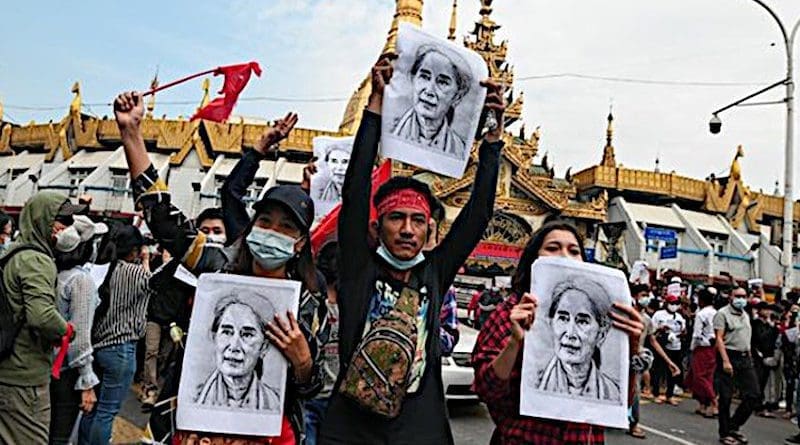The Indonesia Factor In ASEAN’s Response To Myanmar – Analysis
By Gibran Mahesa Drajat*
ASEAN’s capacity to spearhead a collective response to a regional crisis was tested at the ASEAN Leaders’ Meeting (ALM) in Jakarta on 24 April following the February coup in Myanmar. Facing backlash for its decision to invite Myanmar’s military junta leader General Min Aung Hlaing to the event, the stakes were high for ASEAN to find a unified stance on Myanmar’s rogue behaviour. But it was Indonesia’s leadership that made possible the resulting five-point consensus.
Hours before the release of the ALM chairman’s statement, Indonesian President Joko ‘Jokowi’ Widodo held a press conference outlining Indonesia’s position on Myanmar, which resembled the final draft of ASEAN’s collective statement. Several differences between Indonesia and the ALM chairman’s statement stand out.
First, Jokowi conveyed that the situation in Myanmar is ‘unacceptable and cannot be allowed to continue’. The watered-down ALM statement stated a ‘deep concern on the situation in the country, including reports of fatalities and escalation of violence’.
Second, Jokowi called on the military government in Myanmar to cease its use of violence, while the ALM statement made no direct reference to the junta.
Third, Jokowi called for political prisoners to be released. The ALM chairman’s statement worded this as: ‘we also heard calls for the release of all political prisoners including foreigners’.
One of the biggest shortcomings of the ASEAN five-point consensus is the absence of a call for the junta to honour the results of the 2020 general elections that the National League for Democracy (NLD) won in a landslide. While Jokowi emphasised the Myanmar people as Indonesia’s priority, General Min Aung Hlaing’s inclusion in the ALM dashes any hope of restoring a pre-coup state of affairs. The ALM chairman’s statement confirms this.
The ALM was convened on 19 March — five weeks after Jokowi called for an ASEAN special summit to discuss the political crisis in Myanmar. While the meeting was being arranged, the Myanmar military’s violent crackdown against protesters and civilians continued, with at least 739 deaths and 3331 arrests as of 21 April.
ASEAN’s collective stance on the Myanmar political crisis differs from its response during Myanmar’s 2007 Saffron Revolution. When anti-government protests grew in number across Myanmar in September 2007, the military government responded violently, culminating in an ASEAN chairmanship statement three weeks later. The statement singled out the Myanmar military government and expressed revulsion for what had transpired.
Yet despite Indonesia’s best efforts, the ALM chairman’s statement is less assertive than it was in 2007. Naypyidaw’s detachment from ASEAN after forfeiting its chairmanship position in 2006 encouraged ASEAN and its key member states at the time — Indonesia, Malaysia, Singapore and the Philippines — to ensure that Myanmar ameliorated its human rights record before it was trusted with further engagement in ASEAN-led processes.
Aside from the flaws in the ALM statement, there are also challenges to its implementation. Indonesian Foreign Minister Retno Marsudi has managed to find common ground among ASEAN member states on the ongoing political crisis in Myanmar — first at an Informal ASEAN Ministerial Meeting (IAMM) through shuttle diplomacy and subsequently in preparation for the ALM.
The night before the ALM, Marsudi hosted a working dinner with ASEAN counterparts in making final preparations for the leaders’ meeting. Though the leaders of Thailand, the Philippines and Laos were absent from the ALM, a consensus was reached on how to prevent the situation in Myanmar from destabilising the wider region.
Now that ASEAN has articulated a regional response to the situation in Myanmar, it needs to ensure that the junta adheres to the first two points of its five-point consensus — halting the violence and facilitating constructive dialogue between concerned parties. The other three points also require continuous commitment from ASEAN including Myanmar to appoint an ASEAN special envoy, facilitate humanitarian assistance and advance dialogue.
While the implementation of ASEAN’s five-point consensus is still too early to assess, ASEAN must display a tangible commitment to its framework for peace and stability in the region. This is where Indonesia’s role and leadership within ASEAN should be nurtured.
As the regional powerhouse in Southeast Asia, Indonesia is no stranger to advancing initiatives to strengthen political stability in the region. These include former president Megawati Sukarnoputri’s leadership to finalise the ASEAN Political-Security Community, former president Susilo Bambang Yudhoyono’s incorporation of democratic principles in Indonesian foreign relations through the Bali Democracy Forum and President Jokowi’s adoption of the ASEAN Outlook on the Indo-Pacific.
In a climate where Indonesia and ASEAN depend on one another to preserve peace and stability in Southeast Asia, ASEAN needs to remain the cornerstone of Indonesian foreign policy — no matter who its president is.
*About the author: Gibran Mahesa Drajat is a Doctoral Researcher at the Graduate School of Global Studies, Sophia University, Tokyo, and a Lecturer of International Relations at President University, Cikarang, Indonesia.
Source: This article was published by East Asia Forum

